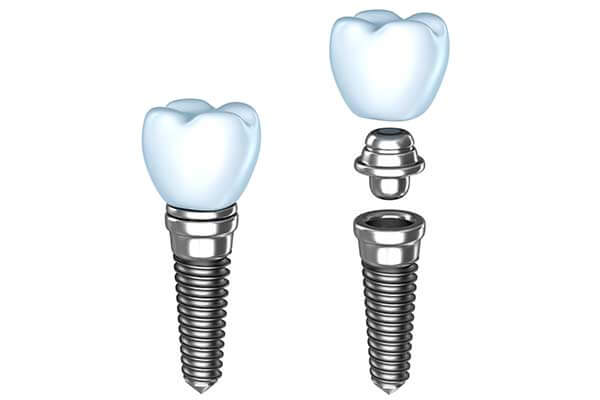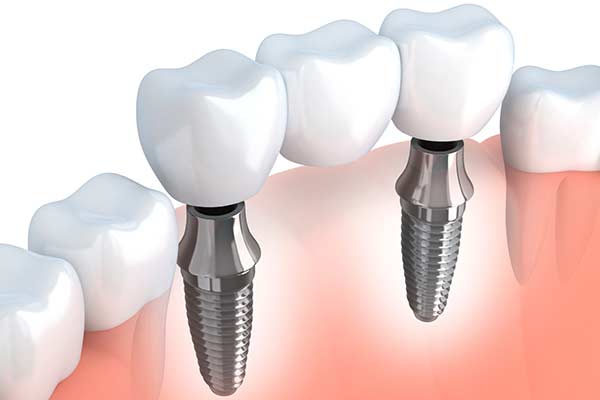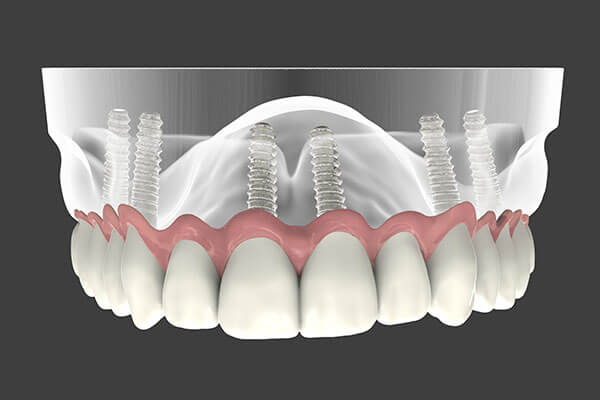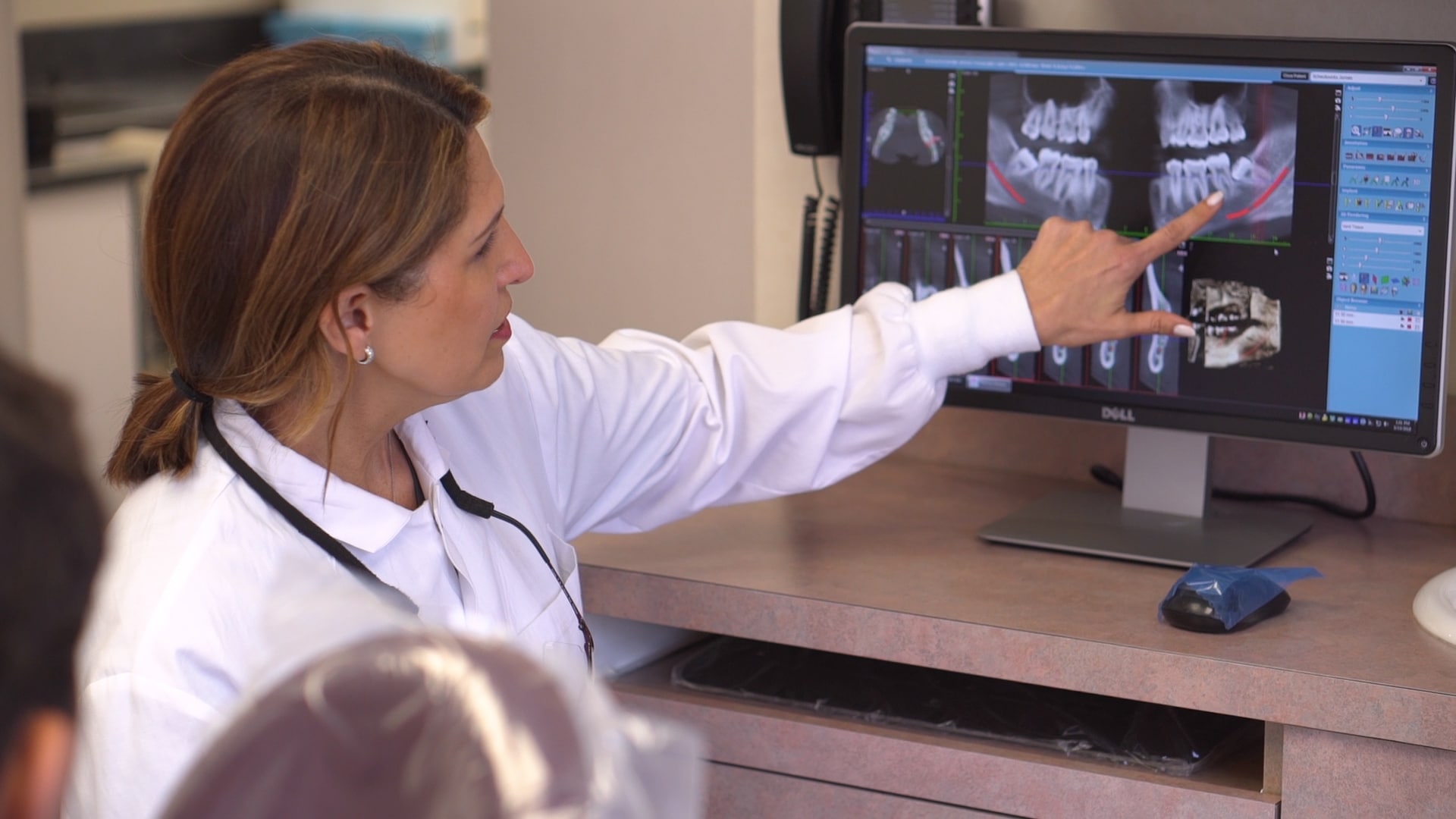Dental Implants in Midtown Manhattan
The Benefits of Dental Implants
Dental implants are the preferred solution for the replacement of a missing tooth or teeth. Dental implants are small anchors made of a biocompatible metal called titanium, which is placed in the jawbone. The anchors begin to fuse with the bone over a few months. After the fusing process, known as osseointegration, abutment posts are inserted into the anchors to allow for the permanent attachment of the replacement teeth.
In addition, dentists recommend dental implants over other options because implants are the only method of tooth replacement that protects the jaw against bone loss. When a fixed bridge or a denture is used to replace missing teeth, the body assumes that the bone is no longer needed and it begins to atrophy in that area. This can alter your facial features and affect your bite.
Dental implants can be easier to maintain than alternatives and can last a lifetime with proper care.
Dental Implant Options
Single Tooth Dental Implants

A single tooth dental implant starts with a titanium post that is placed in the jawbone. Once we are sure that the bone and implant have fused together, we will attach a permanent replacement tooth to the implant. The result is a long-term solution for a missing tooth that restores both function and appearance.
Implant Supported Bridges

Implant-supported bridges are an option when three or more adjacent teeth need to be replaced. Rather than placing single tooth dental implants for each missing tooth, an implant-supported bridge only places implants for the two outermost missing teeth. These two implants serve as abutments that hold a porcelain bridge in place.
Implant Supported Dentures

When all or most teeth are missing, implant-supported dentures use two or more dental implants to hold a partial or full arch denture securely in place. With implant-supported dentures, patients no longer have to worry about their dentures slipping or having to apply messy adhesives each morning.
Guided Implant Placement

We use the latest technology in our office to help us make sure all of our dental implants are placed precisely where they need to be. Guided implant placement uses specialized software to assist us in selecting the exact location, angle, and depth to be used for each implant for optimal results.
Dental Implants Questions
What is a dental implant?
A dental implant is a sterile, screw-like replacement for the root of a missing tooth. Usually, it is made of titanium or zirconia which osseointegrates (fuses) to the surrounding bone and acts like a root to anchor an implant crown.
What are dental implants made of?
Dental implants are made of either titanium or zirconia. Both of these materials are biocompatible and allow the bone to heal around the implant by a process called osseointegration.
How long does it take for dental implants to heal?
The bone healing takes 8-16 weeks depending if bone or soft tissue grafting is necessary at the time of placement.. Please keep in mind that complete osseointegration for maximum bone strength requires approximately 18 months.
Do dental implants ever fail or get rejected by the body?
Yes, but very rarely. In most cases, when implants fail, it is due to the patient having an underlying medical condition, infection of the implant site, smoking, or premature loading of the implant. Once the cause of failure is determined, after sufficient healing, another implant may be placed in the same site with success. If an implant fails after it has been restored with a crown, it can mean that the implant was overloaded with biting forces.
Does implant surgery hurt?
In most instances the placement of dental implants is not uncomfortable and the patient may go back to work the same day or the day after the surgery. It is recommended that a patient refrain from strenuous exercise for 5 days after the procedure. In general, tooth extractions tend to be more uncomfortable because in those instances we are dealing with an infected site rather than a healed, healthy site.
Why is an abutment necessary for a dental implant?
An abutment is an intermediary component that connects the dental implant to an implant crown. The abutment is the post that holds the crown; it is analogous to when your natural tooth is shaved down to hold a crown. The abutment is usually made out of a biocompatible material (titanium or zirconia) in order to minimize inflammation and to keep the tissues around the implant healthy.
Why are implants so expensive?
Implants are made of materials like titanium and zirconia that are expensive to manufacture. Additionally, dental implants are manufactured under strict guidelines and need to be sterile in order to be used in humans. They require FDA approval, which requires extensive research and documentation. Doctors who perform the procedures need additional training and experience to properly perform this therapy. Finally, the instrumentation, clinical setup, and components used in the procedures are expensive.
Who should be performing dental implant treatment?
Any licensed dentist in the US can perform dental implant treatment. However, it is recommended that patients choose dentists with postgraduate specialty training such as periodontists and oral surgeons as they are better prepared to address this complex therapy, especially the more complicated cases. Periodontists and oral surgeons are usually better versed in the surgical aspects, while prosthodontists are better in performing restorative procedures. That said, there is a great deal of cross-training and it really depends on the specialists’ experience with implants. Postgraduate training and specialty board certification are important qualifications when selecting a doctor.
The Benefits and Importance of Dental Implants
Want to know more about why you should choose dental implants?
Learn More About the Benefits of Dental ImplantsContact Us Today
Are you ready to restore your smile with dental implants? Call us today at 212-486-6622 to schedule an appointment to learn more about our implant options and find the right fit for your needs.

